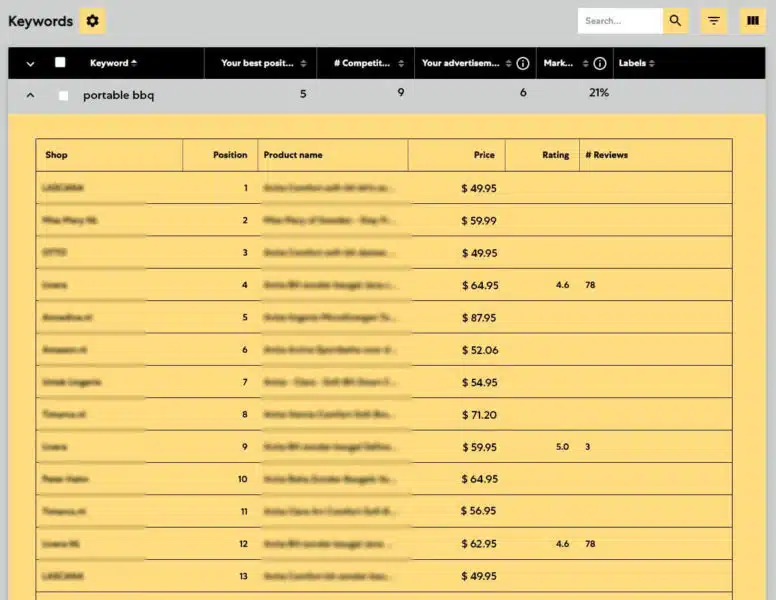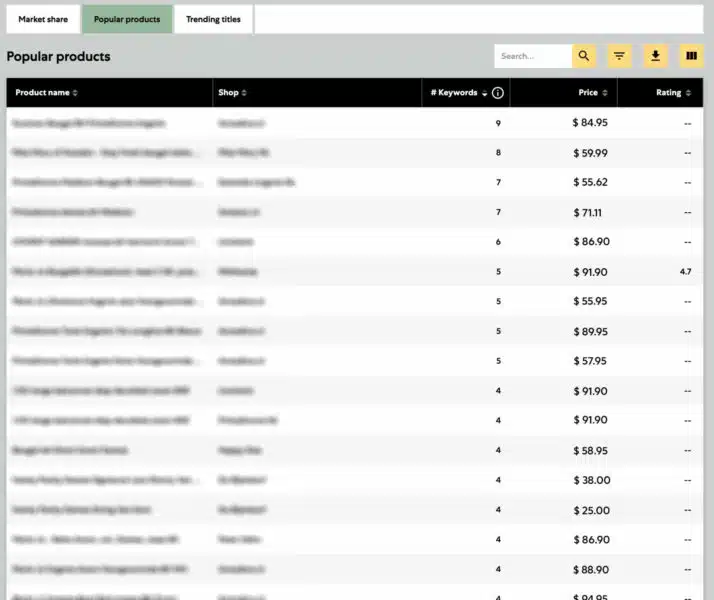Keyword insights for Google Smart Shopping is back
A new method for an automated and structural collection of crawl data.

Keywords are inseparable from Google. As an advertiser, we also know that those searches of many millions of users represent enormous commercial value. One search term can be worth more than another, and search marketers like to take that into account when they spend on Google. Moreover, all those searches also give you an idea of the market in which you work. You are, as it were, connected one on one with the needs of your market and your customers. But, what about now that Google is increasingly closing down insights on search terms?
The answer is data. An article on Search Engine Land indicates you can automatically gain great cross and upsell insights with the right data. For example, by adding POAS (profit data) to Google’s bid simulator, you can also steer on turnover and profit.
This article will discuss a new field within our data science: recovering keyword insights. Ultimately, you will soon be able to make the switch from the well-known “feeding the algorithm” to a new variant: “surfing the algorithm.” You will understand why by the end of this article.
Smart Shopping as a black box
When it comes to closing insights, Google does this the most with Smart Shopping Campaigns. You simply no longer see which terms you rank on. Google only releases data in terms of impressions, clicks, and conversions at the product level. You can still see market developments in search behavior using the keyword planner, but that market development is no longer reflected in your own campaigns.
Many advertisers have thus lost their grip and see Google Smart Shopping as a black box. All kinds of things happen, but what? In addition to the loss of insights into search terms, the way that shopping “rankings” are established within Google remains a mystery. You only get brief directions from Google, and you also see something like your impression share. But if you read the definition of impression share, you’re more likely to be left with more than a few questions:
Impression share = impressions / total number of eligible impressions. Eligible impressions are estimated based on many factors, including targeting settings, approval status, and quality. Impression share data is available for campaigns, ad groups, product groups (for Shopping campaigns), and keywords.”
Does this make you any the wiser?
A logical comparison of “mysteries” within SEO
Many factors determine the number of impressions and the ranking within Google Shopping. We know from search ads that your bids play an important role, and we also know that your CTR and later other quality characteristics were traditionally decisive. However, other factors will undoubtedly also play a role, such as the price of your product, for example.
Consumers want low prices, so Google will give preference to cheaper providers. And what is the actual impact of your product titles within the Shopping Algorithm? A multitude of factors determine your rankings, but you do not know the terms you’re ranking on. Or when. In any case, that is very similar to what we know from Search Engine Optimization (SEO).
Numerous factors play a role within SEO, but Google only gives you limited insights there. SEO is constantly looking at how the algorithm develops and the factors that Google is sensitive to. To keep a grip on developments and their own position within Google, SEO specialists collect extra data, namely keyword ranking data. That way, they keep a sense of the effect of adjustments they make to rank better. The keyword insights are the compass by which they steer.
Grip back through keyword rankings for Smart Shopping
Do you want to regain control of Smart Shopping campaigns? Then you can build your own data. Adchieve, has developed a tool that collects keyword data and brings insights back to Smart Shopping by structurally and automatically collecting search term data (crawling). We try to illustrate this with freshly generated print screens from our software. Because data is sometimes competition sensitive, we have blurred it.

This crawl data helps you understand what is happening within Google Smart Shopping. You can see what effects are (at keyword level) of, for example:
• Adjustments to your ROAS
• Changes in your price proposition
• The effects of improvements in your product scores
• The change of titles
• The impact of new products on your rankings
In this way, the black box opens again, and you can do experiments where you get more focused “feedback” on what that means in terms of your rankings for your key search terms.
The insights are useful for PPC specialists and online marketers. They receive data that they can use to immediately optimize campaigns or see the effects of their adjustments. For e-commerce managers, the data is of strategic importance because you get to know your position in relation to your competitors. You will also learn your competitors’ top products and how they position themselves within Google Shopping.
What are popular products?
Crawling builds more than just data about your search terms. For one of our clients/advertisers, in our tooling, we follow rankings in 30 countries with 2,000 search terms for each country. You often get about nine or 29 ranking products per search term. After a month, in the case of this advertiser, calculating with an average of 20 results per search term – you have 36,000,000 (!) records full of data about yourself and all your competitors.
If you bundle all that data, you can make a list of the products that appear most in Google’s rankings. Of course, it is interesting to ask whether these are products you also offer, but ones in which your competitor ranks better. Or whether they are products that you do not have in your range.
In practice, we already see that an interesting interaction arises between the marketing and purchasing departments in this way. The marketing department, more than ever, has an interest in purchasing to ensure that the right products are on the shelf.

Learn from trending titles
With all the collected data, all the product titles of your competitors are also available. You can make this transparent via n-grams, a unique word combination by counting which n-grams (consisting of combinations of at least two words) were most common among competitors and not in their own feed. This insight can, for example, be a source to find your own blind spots and optimize your titles. See the image below.

Insight into your market share
Below is an example of crawl data built up in Adchieve’s tooling as a market share. That market share illustrates the percentage of the positions taken by your advertisements within Google Shopping. It is also possible to label keywords to easily determine your market share within groups of keywords.
You immediately see within which type of search you are strongly represented and the searches where your competitors have an advantage.

Surfing the algorithm
Data science is of paramount importance to Adchieve. With newly gained insights from collecting big data, you create a new picture of reality and new ideas about optimizing your campaigns. How can you feed Google’s algorithm so that you rank better? Google Smart Shopping is no longer a wave that comes over you. If you understand the importance of data science and can use the right tooling, you will be “in control” again, and you can steer through the waves instead of drowning in them by surfing the algorithm.
Keyword Insights: free trial
Also, start collecting Keyword Insights. Request the 14 Day Free Trial now. Within a few days, you can benefit from insights into your keywords and market share:
Go to the 14 Day Free Trial
Want to stay informed of our developments? These are our previous articles published on Search Engine Land:
1: Optimize Smart Shopping campaigns: Manage turnover and margin (searchengineland.com)
2: Smart Shopping Campaigns: How SEA specialists score with new insights (searchengineland.com)
Want to stay informed of our future developments? Follow the Adchieve Linkedin Page.
Opinions expressed in this article are those of the sponsor. Search Engine Land neither confirms nor disputes any of the conclusions presented above.


